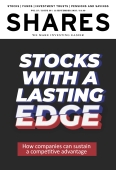Archived article
Please note that tax, investment, pension and ISA rules can change and the information and any views contained in this article may now be inaccurate.
Hedge fund filings reveal significant shifts in holdings in the second quarter

Last month we revealed which stocks hedge funds had been shorting in the second quarter after the remarkable post-Liberation Day rally which has seen UK and UK markets hit record highs.
This month, with the help of Joachim Klement and Susana Cruz of Panmure Liberum’s strategy, economics and ESG team, we take a look at which UK and European stocks are most popular with hedge funds and which stocks they have been buying and selling.
TECH AT THE TOP
Hedge funds get a bad rap from some companies and investors for selling stocks in order to profit from a fall in the share price, but in most cases they will have done a great deal of research on the stocks in question and concluded they are either bad businesses, badly-run businesses or they are overvalued and will therefore underperform.
By the same token, they only buy shares in companies they believe will outperform, on the basis they are better-than-average or undervalued, which means they often take quite contrarian bets and their ‘active share’ – that is the proportion of the portfolio which is different to the benchmark – tends to be quite high.
The second quarter of this year saw a spike in stock market volatility and political uncertainty due to the fallout from the Liberation Day tariff announcement, which presented investors – hedge funds included – with a huge opportunity set.
According to the 10-Q filings of around 2,000 hedge funds, the most popular – as in widely-owned – European stock is Dutch semiconductor equipment maker ASML (ASML:AMS) with some 309 funds owning the shares or 15.1% of the total, and 23 funds holding the stock among their top 10 positions.
Considering tariffs weren’t introduced on semiconductors, and the fact there is a shortage of large-cap tech stocks in Europe compared to the US, ASML is not a bad choice, and it seems as though hedge funds added to their positions in the second quarter, taking advantage of the initial sell-off.
The next most widely-owned stocks were energy firm Shell (SHEL), health care companies Novo Nordisk (NOVO-B:CPH) and Novartis (NOVN:SWX) and consumer goods giant Unilever (ULVR).
As Klement and Cruz note, the list of most popular stocks is mostly made up of companies which aren’t directly affected by tariffs, such as healthcare, services or commodities.
‘Hedge funds are trying to stay out of the way of geopolitical uncertainties where possible,’ conclude the analysts.
Focusing on the stocks most commonly found in hedge funds’ top 10 holdings throws up three more interesting names, Belgian biotech firm Argenx (ARGX:EBR), Spanish biotech Grifols (GRF:BME) and Irish budget airline Ryanair (RYAAY:NASDAQ).
WAXING AND WANING
If we look at the most significant changes in holdings during the quarter, outside of the most popular stocks – which funds are wont to trade in and out of as prices move up and down – there are some notable entries with.
The stock which saw the most buying interest in the second quarter, relative to the first quarter, were Dutch insurer Aegon (AGN:AMS), Swiss industrial equipment and robot-maker ABB (ABBN:SWX), French cosmetics firm L’Oreal (OR:EPA) and two UK media companies, Pearson (PSON) and WPP (WPP).
The last two are a prime example of contrarian thinking, given they are among the worst-performing stocks in the FTSE 100 year-to-date.
On the flip side, stocks with the largest decline in holdings among hedge funds during the quarter include defence contractor BAE Systems (BA.) and medical devices firm Smith & Nephew (SN.), two of the best-performing stocks in the index this year, suggesting managers feel it is time to book some profits.
Also noteworthy is the drop in popularity of Danish diabetes and weight-loss drug maker Novo Nordisk, which although it still appears on the most-held list is owned by fewer hedge funds than previously, suggesting hedge funds are ‘increasingly giving up on a turnaround’ after a 43% fall in the share price year-to-date, muse the analysts.
Important information:
These articles are provided by Shares magazine which is published by AJ Bell Media, a part of AJ Bell. Shares is not written by AJ Bell.
Shares is provided for your general information and use and is not a personal recommendation to invest. It is not intended to be relied upon by you in making or not making any investment decisions. The investments referred to in these articles will not be suitable for all investors. If in doubt please seek appropriate independent financial advice.
Investors acting on the information in these articles do so at their own risk and AJ Bell Media and its staff do not accept liability for losses suffered by investors as a result of their investment decisions.
 magazine
magazine








